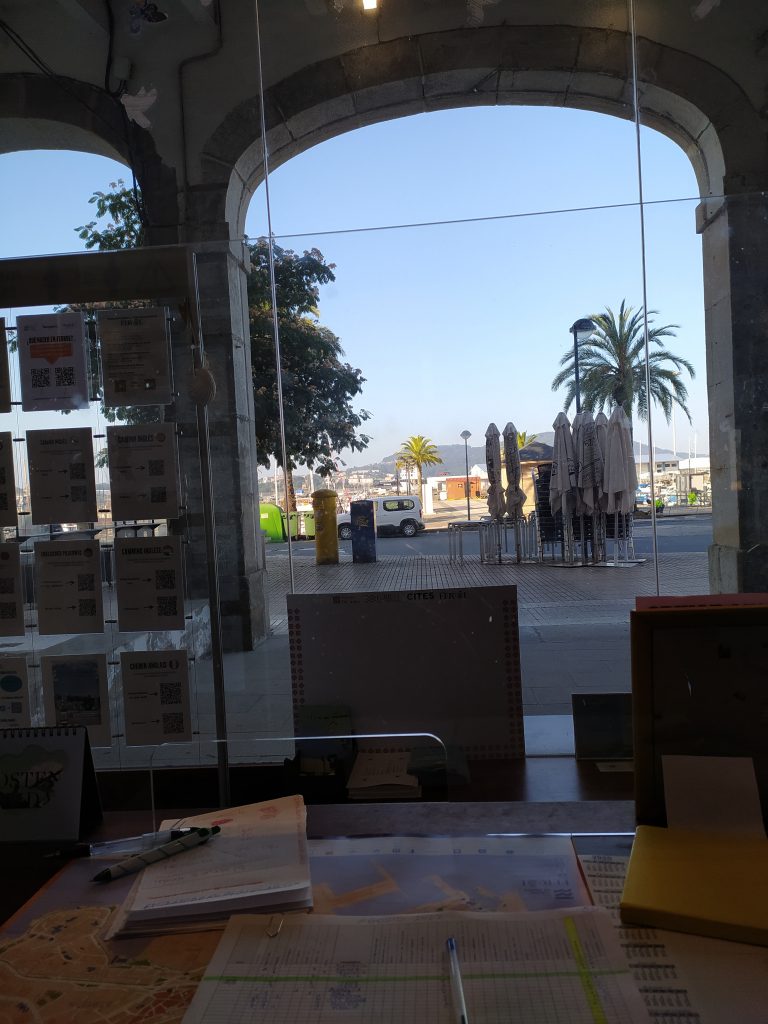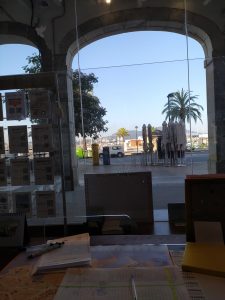
A week in the pilgrim office

?? It’s not about the place, it’s about the people.
This is the most important thing I’ve learnt this week. I’ve been working in the pilgrim office for 4 days with three different colleagues, each of them has taught me something.
The first two days I met Jorge, he’s from Ferrol but he has done an erasmus in Bari, where he began to learn italian and now he’s a guide for the groups in the camino both in spanish and italian. As he told me Tuesday and Wednesday are two busiest days of the week because it takes 5-6 days to complete the English way so many pilgrims start on these days to arrive in Santiago on Sunday. Most of them just want to buy the pilgrim credential and want us to make the first stamp with the date, the ones who already bought it come just for the stamp.
But why is this so important? Going back in time when the pilgrims started the camino from their home, without the certainty to return, mostly for religious reasons, the church gave them protection during the way. To prove they truly went to Santiago, when they arrived, they were given the compostella a paper certificate with your name and the sign of the archbishop of Santiago. Now to get the compostella you have to show your “pilgrim passport” with at least two stamps a day demonstrating that you came to Santiago walking or cycling,and you can get them in cafeterias, hostels, churches…
Nowadays the pilgrim credential is mostly used as a memory of the camino and all the places in which you passed.
The next day, in our spare time, Jorge and I had fun doing a spanish lesson jumping from pole to pole, from buenas noches to jamon serrano. I’ve learnt useful things for daily life and also funny things that are nice to remember.
The pilgrim office is in the port, near the starting point of the camino and in the centre of the city so not only pilgrims come to the office, but also some tourists that are in Ferrol for one or two days and want an overview of the special things to do in the city.
I visited the city quite well now, and after listening to what Jorge said to them two or three times, if the tourists understood English or Italian I was able to manage them on my own.
The morning after I met Marta, she’s also from here but now she lives in Mugardos, on the side of the sea looking from the port. The day we spent together was so fun, she spoke a little bit of italian mixed with spanish so I tried to teach her some italian while learning some spanish. She was so enthusiastic that when someone came in she introduced me and the project I was doing so that everybody could know that I was a volunteer and I was learning spanish, and sometimes she also asked me to show my achievements. On that day, almost all of them were Italians so it was easy for me but also very challenging to manage all those people on my own.
The last day I was with Fernando, he’s from A Coruna but he lives here for work now and he’s one of the proudest Galician I’ve ever met. In the morning not a lot of people came so we had time to talk about Galicia and Italy. He was telling me that Galician people are so patriotic and some of them want independence from the rest of Spain. This is possible, unlike Italy, because they have their own language and their own territory, but from his point of view it’s really difficult to obtain it because their economy is not so strong.
Then he tried to teach me the main spots of Ferrol in Spanish but without great success, and so we started looking for legends and traditions about Galicia for my project’s last exhibition.
At the end each of them left me something and what seemed like a simple job in a tourism office turned into a great educational experience !
?? No se trata del lugar, se trata de la gente.
Esto es lo más importante que he aprendido esta semana. Llevo 4 días trabajando en la oficina del peregrino con tres compañeros diferentes, cada uno de ellos me ha enseñado algo.
Los dos primeros días conocí a Jorge, es de Ferrol pero ha hecho un erasmus en Bari, donde empezó a aprender italiano y ahora es guía de los grupos del camino tanto en español como en italiano. Según me dijo martes y miércoles son los dos días más concurridos de la semana porque se tardan 5-6 días en hacer el camino inglés por lo que muchos peregrinos empiezan esos días para llegar a Santiago el domingo. La mayoría solo quieren comprar la credencial de peregrino y quieren que les pongamos el primer sello con la fecha, los que ya la compraron vienen solo por el sello.
Pero, ¿por qué es esto tan importante? Retrocediendo en el tiempo cuando los peregrinos iniciaban el camino desde su hogar, sin la certeza de regresar, en su mayoría por motivos religiosos, la iglesia les brindaba protección durante el camino. Para demostrar que realmente fueron a Santiago, cuando llegaron, se les entregó la compostelana un certificado en papel con su nombre y la firma del arzobispo de Santiago. Ahora para conseguir la compostelana tienes que mostrar tu “pasaporte del peregrino” con al menos dos sellos al día demostrando que has venido a Santiago andando o en bicicleta, y puedes conseguirlos en cafeterías, albergues, iglesias…
Hoy en día la credencial del peregrino se utiliza mayoritariamente como recuerdo del camino y de todos los lugares por los que has pasado.
Al día siguiente, en nuestro tiempo libre, Jorge y yo nos divertimos haciendo clases de español “saltando de poste en poste, de buenas noches a jamón serrano”. He aprendido cosas útiles para la vida diaria y también cosas divertidas que son agradables de recordar.
La oficina del peregrino está en el puerto, cerca del punto de inicio del camino y en el centro de la ciudad por lo que no solo acuden peregrinos a la oficina, sino también algunos turistas que están en Ferrol uno o dos días y quieren una visión general de la cosas especiales que hacer en la ciudad.
Visité bastante bien la ciudad, y después de escuchar lo que Jorge les decia dos o tres veces (si los turistas entendían inglés o italiano), podía manejarlos por mi cuenta.
A la mañana siguiente conocí a Marta, ella también es de aquí pero ahora vive en Mugardos, al lado del mar mirando desde el puerto. El día que pasamos juntas fue muy divertido, ella hablaba un poco de italiano mezclado con español, así que traté de enseñarle algo de italiano mientras aprendía algo de español. Estaba tan entusiasmada que cuando alguien entraba me presentaba a mí a y el proyecto que estaba haciendo para que todos supieran que yo era voluntaria y estaba aprendiendo español, a veces también me pedía que mostrara mis logros. Ese día, casi todos eran italianos, así que fue fácil para mí, pero también muy desafiante, manejar a todas esas personas por mi cuenta.
El último día que estuve con Fernando, es de A Coruña pero ahora vive aquí por trabajo y es uno de los gallegos más orgullosos que he conocido. Por la mañana no vino mucha gente así que tuvimos tiempo de hablar de Galicia e Italia. Me decía que los gallegos son muy patriotas y algunos quieren la independencia del resto de España. Esto es posible, a diferencia de Italia, porque tienen su propio idioma y su propio territorio, pero desde su punto de vista es muy difícil conseguirlo porque su economía no es tan fuerte.
Luego intentó enseñarme los principales lugares de Ferrol en español pero sin mucho éxito, así que empezamos a buscar leyendas y tradiciones sobre Galicia para la última exposición de mi proyecto.
Al final cada uno de ellos me dejó algo y lo que parecía un simple trabajo en una oficina de turismo se convirtió en una gran experiencia educativa!
- Volunteer
- English Way


